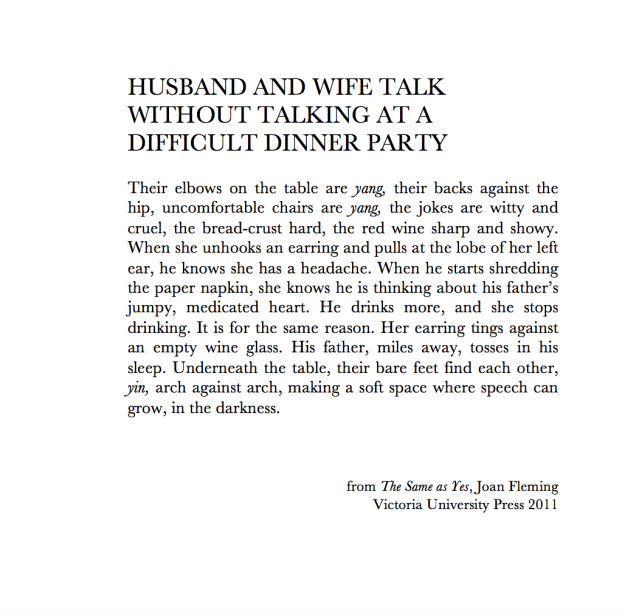
Note from Wen-Juenn Lee:
I first read Joan Fleming’s ‘Husband and Wife Talk Without Talking At A Difficult Dinner Party’ at university, when something about the simple domesticity yet the ‘intolerable solitude’ of love (‘Translations VI’, Failed Love Poems) struck me – at a time when I was just beginning to read tragic, suburban love stories by Raymond Carver. (I liked the line, ‘He drinks more and she stops drinking. It is for the same reason’ and I did not know why, until later I realised that it reminded me of the wife in ‘The Student’s Wife’, who wakes up in the middle of the night and calls her husband’s name, but he does not answer.)
Love is different in ‘Husband and Wife Talk Without Talking At A Difficult Dinner Party’, different because it is not marked by suffocating drabness, but sleepy attentiveness, knowing the patterns of someone else with the instinctiveness you know it’s going to rain when storm clouds appear. (Simone Weil: ‘Attentiveness is the rarest form of generosity.’) It is with this attentiveness that the poem breathes: there is the hard brittleness of a wine glass, the clattering of forks, underpinned by the softness of silent communion. A couple sits, one drinks and one doesn’t, and they suffer quietly, and maybe they’ll leave and go to bed, alone with their griefs and little traumas. Maybe they will talk without saying anything important at all.
Here, we have the external actions of people, yang, and the inarticulate feelings they have, yin. This heartbeat of yin and yang underpins the very heartbeat of the poem. Yang, the boundaries in self between you and me, yang, the face I present to the wider world: of husband shredding his napkin, of wife touching her earlobes. In this, I am reminded of my parents who interact with the formality of Chinese tradition. My parents do not say, ‘I love you’, but ask ‘have you eaten?’ Yet. They know I talk loudly when I’m tired and they know when I’m irritated and trying to disguise it with forced cheer; they would just never tell me they know. To the outsider, someone walking past the window, a plus one at the party, anyone that isn’t the husband or wife, maybe they would notice the shredded napkin, the unnecessary earlobe-touching, but they can only guess; they can observe but never decode. This is a poem of extended people-watching, in the sense that we too, are outsiders with the privilege of understanding a couple’s private state, if only fleetingly.
When we are lucky enough to know people that know us intimately, that know us well, they will know the difference between your laugh and your forced laugh, and this is where the duality of yin and yang can occur. Husband and wife are having a conversation without using their words at all. She says, I have a headache. He says, I’m worried about my father. The dinner party is Difficult because maintaining your yang is Difficult in the face of your worries, because expressing your yin is near impossible. I found the last line in the poem so devastating, not because it ends with silence, but something of the frail and incomplete yin, ‘a soft space where speech can grow’. This tender, fragile possibility of communion (in whatever form that takes) is part of the larger love letter I see in Joan Fleming’s The Same As Yes. It struck me then, as it strikes me now, how ordinary intimacy and its limits can feel to me more concrete, more sorts of tragic, than anything else.
Wen-Juenn Lee works in Melbourne, and writes when she can. She writes about Wellington, her family, and her feelings. Her work has appeared in Landfall, Southerly, and other publications.
Joan Fleming is the author of two collections of poetry, The Same as Yes and Failed Love Poems, both from Victoria University Press, and the chapbook Two Dreams in Which Things Are Taken (Duets). Her new collection Dirt is forthcoming with Cordite Books. She holds a PhD in ethnopoetics from Monash University, Melbourne, and is the New Zealand/Aotearoa Commissioning Editor for Cordite Poetry Review. She currently lives in Madrid, and in 2020 she will travel to Honduras for the Our Little Roses Poetry Teaching Fellowship.
Victoria University Press author page

